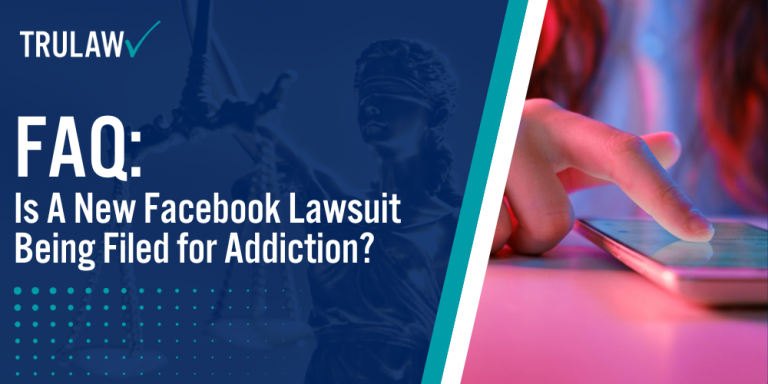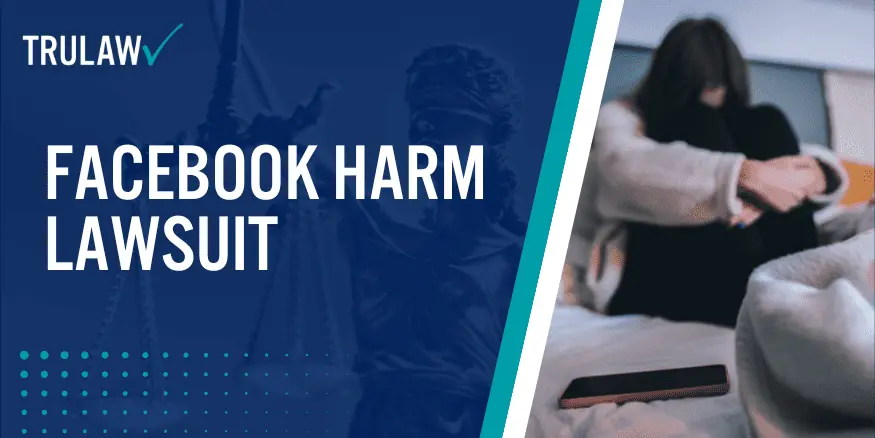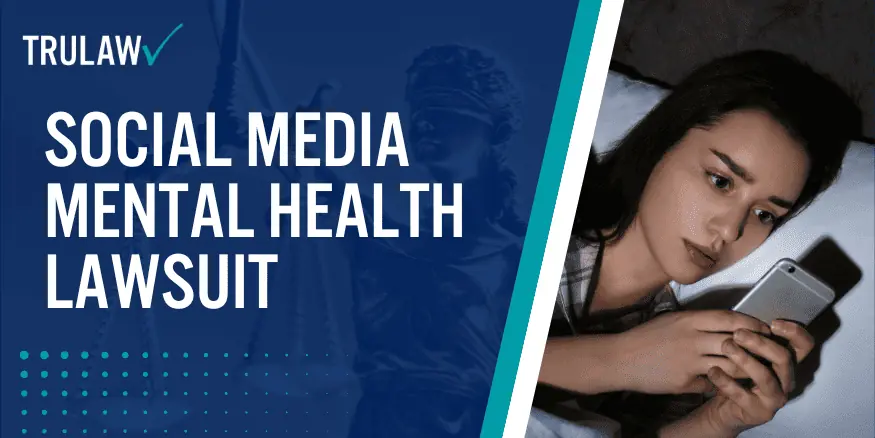Instagram Addiction Lawsuits on the Rise
- Last Updated: July 9th, 2024

Attorney Jessie Paluch, founder of TruLaw, has over 25 years of experience as a personal injury and mass tort attorney, and previously worked as an international tax attorney at Deloitte. Jessie collaborates with attorneys nationwide — enabling her to share reliable, up-to-date legal information with our readers.
Legally Reviewed
This article has been written and reviewed for legal accuracy and clarity by the team of writers and legal experts at TruLaw and is as accurate as possible. This content should not be taken as legal advice from an attorney. If you would like to learn more about our owner and experienced injury lawyer, Jessie Paluch, you can do so here.
Fact-Checked
TruLaw does everything possible to make sure the information in this article is up to date and accurate. If you need specific legal advice about your case, contact us by using the chat on the bottom of this page. This article should not be taken as advice from an attorney.
Overview of Instagram Addiction Lawsuits
On this page, we’ll discuss Instagram Addiction Lawsuits, the impact of Instagram addiction on mental health, legal grounds for filing an Instagram lawsuit, and much more.
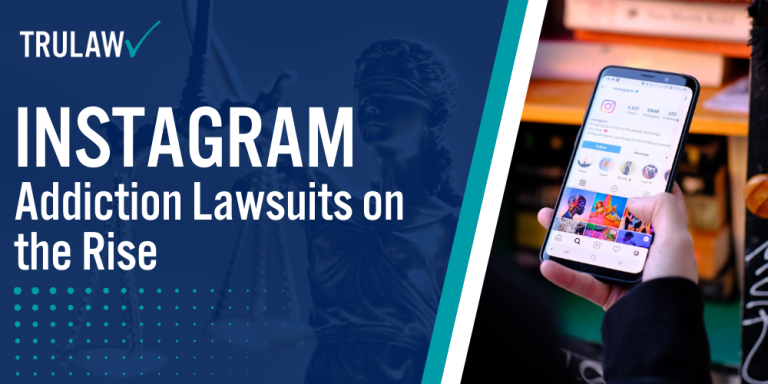
Intro to Instagram Addiction Lawsuits
Some key aspects of Instagram Addiction Lawsuits include:
- Exploitative Features: Claims that Instagram’s features, such as likes and filters, are designed to exploit psychological vulnerabilities and encourage addiction.
- Body Image Issues: Allegations that Instagram’s emphasis on appearance and perfection can lead to body image disorders and low self-esteem.
- Inadequate Content Moderation: Accusations that Instagram fails to effectively moderate harmful content, which can exacerbate addiction and mental health issues.
- Targeting Young Users: Claims that Instagram’s marketing strategies target young users more susceptible to the platform’s addictive nature.
If you or a loved one has suffered from mental health issues due to Instagram addiction, you may be eligible to seek compensation.
Contact TruLaw using the chat on this page for an instant case evaluation to determine if you qualify to join others filing Instagram Addiction Lawsuits.
Table of Contents
Utah's Lawsuit Against Meta Platforms and Instagram
Utah has taken legal action against Meta Platforms, Inc., the parent company of social media giants Facebook and Instagram, citing deceptive practices and designing addictive features detrimental to youth.
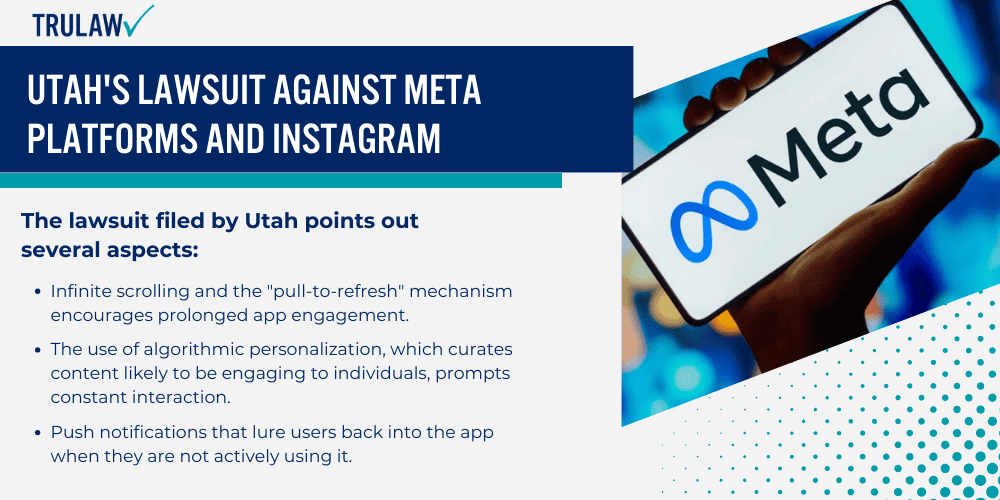
Allegations of Deceptive and Addictive Features
Utah’s government asserts that Meta knowingly incorporated addictive features into Instagram, specifically targeting young users. These features, they claim, are crafted to retain users’ attention for extended periods, potentially leading to addiction. The lawsuit filed by Utah points out several aspects:
- Infinite scrolling and the “pull-to-refresh” mechanism encourages prolonged app engagement.
- The use of algorithmic personalization, which curates content likely to be engaging to individuals, prompts constant interaction.
- Push notifications that lure users back into the app when they are not actively using it.
- A reward cycle based on likes and comments creates a psychological dependency.
Through these elements, Utah is holding social media companies accountable for what they deem to be unethical design choices that prioritize user engagement over well-being.
Meta’s Alleged Prioritization of Profits Over Safety
The allegations extend beyond just the addictive mechanics; Utah charges that Meta favored financial gain over user safety. Here’s what the state has highlighted:
- A preference for growth and engagement metrics that advance advertising revenue over measures that would enhance the safety and well-being of its users.
- Meta’s reluctance to implement stricter usage controls for younger demographics, despite evidence suggesting the necessity for such measures.
- Findings from internal research purportedly indicate awareness of potential harm to young users, but these were not sufficiently acted upon.
- Claims that despite public assurances, Meta has consistently opted for profits at the cost of adequately protecting its user base from the risks associated with social media use.
By bringing forth this lawsuit, they seek to hold tech giants like Meta responsible for maintaining a balance between profitability and the safety of its users, especially the vulnerable youth demographic.
The Rise of Social Media Addiction Litigation
Instagram’s legal challenges are part of a wider trend as social media addiction garners more attention.
- Bipartisan Support: The litigation against major social media companies has bipartisan backing, indicating widespread concern and demand for accountability.
- Precedent: This current wave of lawsuits could set a legal precedent regarding social media companies’ responsibilities to their users.
- Catalyst for Change: Growing legal action could lead to widespread changes in how social media platforms operate.
- Consumer Protection: At the heart of these lawsuits is focusing on consumer protection, particularly for younger users.
By shedding light on the inner workings of social media companies, these lawsuits aim to ensure that the welfare of users, especially minors, is not undermined by corporate practices. The Instagram addiction lawsuits signify a critical moment for legal and ethical scrutiny into the influence of technology on mental health.
Mental Health Impact of Social Media on Young Users
The pervasive use of social media has raised concerns about its effects on the mental health of young users. Cases of depression and anxiety have been linked to social media use, while habitual scrolling can lead to harmful social comparison.
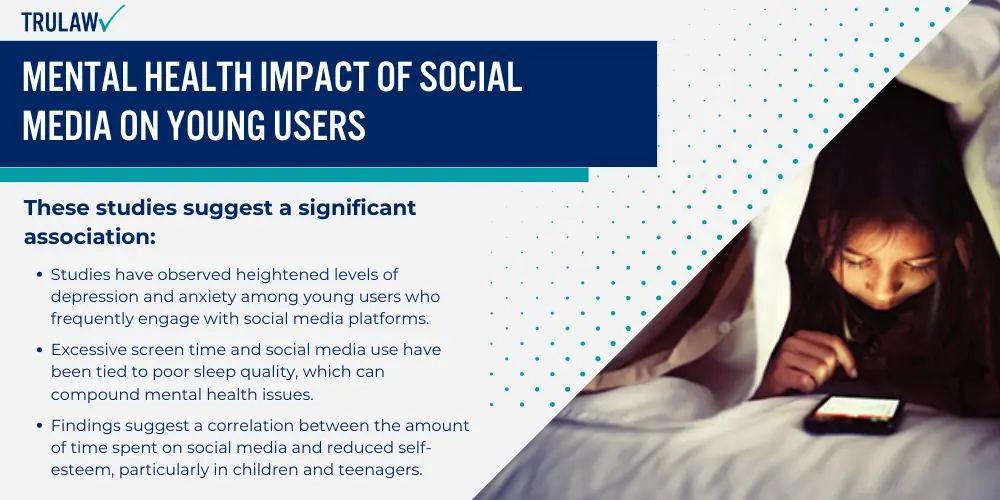
Studies Linking Social Media to Depression and Anxiety
Recent research has established connections between social media usage and the development of mental health issues in adolescents. These studies suggest a significant association:
- Studies have observed heightened levels of depression and anxiety among young users who frequently engage with social media platforms.
- Excessive screen time and social media use have been tied to poor sleep quality, which can compound mental health issues.
- Findings suggest a correlation between the amount of time spent on social media and reduced self-esteem, particularly in children and teenagers.
- Researchers report a rise in mental health crises amongst young people, paralleling the rapid growth of social media use.
Role of Social Comparison and Unrealistic Standards
The negative impact of social media often arises from a culture of continuous comparison and the pursuit of unattainable standards:
- Engagement with highly curated content can foster feelings of inadequacy and lower self-worth through constant comparison.
- Young users may develop a distorted view of reality based on the unrealistic lifestyles and body images prevalent on social media.
- Adolescents can experience pressure to conform to the showcased standards, contributing to increased mental health issues.
- Efforts by youth mental health programs strive to educate and assist young social media users in understanding and combating these harmful effects.
Social Media's Influence on Body Image and Eating Disorders
In a digital age where image is often seen as currency, the impacts of social media on body image and eating disorders have become a focal point of legal and medical concern.
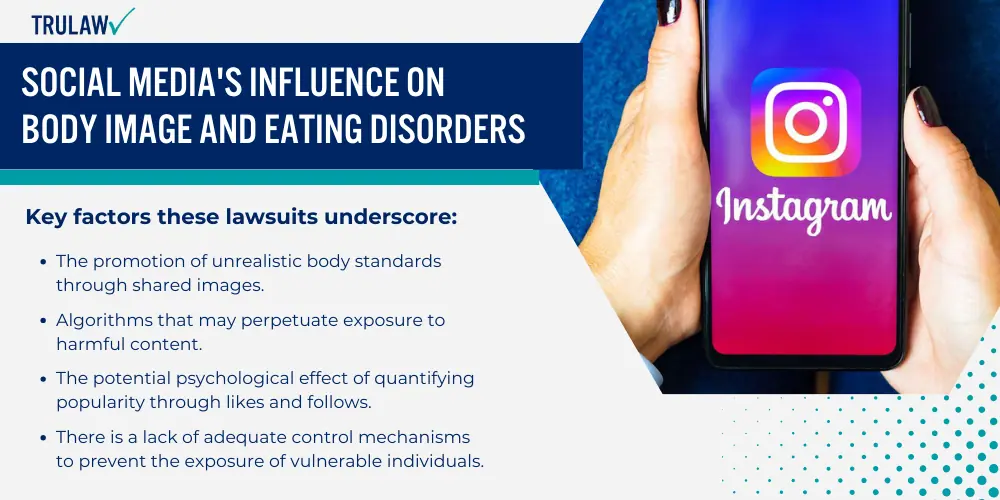
Lawsuits Citing Anorexia, Bulimia, and Binge Eating Disorder
A growing number of lawsuits have emerged, with plaintiffs arguing that social media platforms contribute to the development of eating disorders like anorexia, bulimia, and binge eating.
These legal actions underscore the negative impacts that platforms can have on users, particularly on young adults and teens.
Key factors these lawsuits underscore:
- The promotion of unrealistic body standards through shared images.
- Algorithms that may perpetuate exposure to harmful content.
- The potential psychological effect of quantifying popularity through likes and follows.
- There is a lack of adequate control mechanisms to prevent the exposure of vulnerable individuals.
One notable case involves Instagram, where social media litigation argues that the platform’s design is inherently flawed in a way that maximizes screen time at the cost of users’ mental health.
Research on Appearance Comparisons and Body Dissatisfaction
Recent research highlights a link between social media and issues surrounding body image and self-perception.
There’s an inherent tendency for users to engage in appearance comparisons, which often lead to body dissatisfaction and can exacerbate conditions such as low self-esteem and body dysmorphic disorder.
Significant findings include:
- Social media platforms host content that fuels body image concerns.
- The internalization of ideal body types leads to body dissatisfaction.
- The high prevalence of body image-related disturbances among social media users.
- The association between time spent on platforms like Instagram and increased body dissatisfaction among youth.
These insights emphasize the need for a closer examination of content on social media platforms and their potential role in the spread of eating disorders.
The Addictive Design of Social Media Platforms
Social media platforms have been meticulously engineered to encourage excessive use and foster an addictive nature through their interactive features and content delivery algorithms.
Slot-Machine-Like Functionalities and Constant Alerts
Social media apps are often likened to slot machines, employing random rewards and anticipation to keep users engaged.
- Platforms often employ features that mimic the random reward systems found in gambling, providing users with inconsistent yet potent dopamine hits.
- They send out constant notifications that pull users back in, creating a cycle of anticipation and satisfaction.
- Seeing the number of likes, shares, or comments can become a compulsive check for many, driving them to use the app more.
- Features like stories that disappear after 24 hours create a sense of urgency, compelling users not to miss out.
Algorithmic Promotion of Engaging but Harmful Content
Algorithms play a central role in dictating the user experience on social media by curating content that maximizes engagement.
- They often prioritize content that elicits strong emotional responses, which can include harmful content.
- These algorithms are designed to keep users scrolling for extended periods, contributing to the platforms’ addictive nature.
- Promoting sensational or controversial posts can create echo chambers and intensify beliefs.
- Platform tracking user interaction displays personalized content that reinforces their engagement patterns.
The design features of social media platforms, from the variable rewards system to the algorithmic curation of content, contribute to their addictive quality and the problematic excessive use by individuals.
Deceptive Practices and Misleading Public Reports by Meta
Meta, Instagram’s parent company, is facing significant scrutiny over the contrast between its internal research and public statements, which highlights a lack of transparency and accountability.
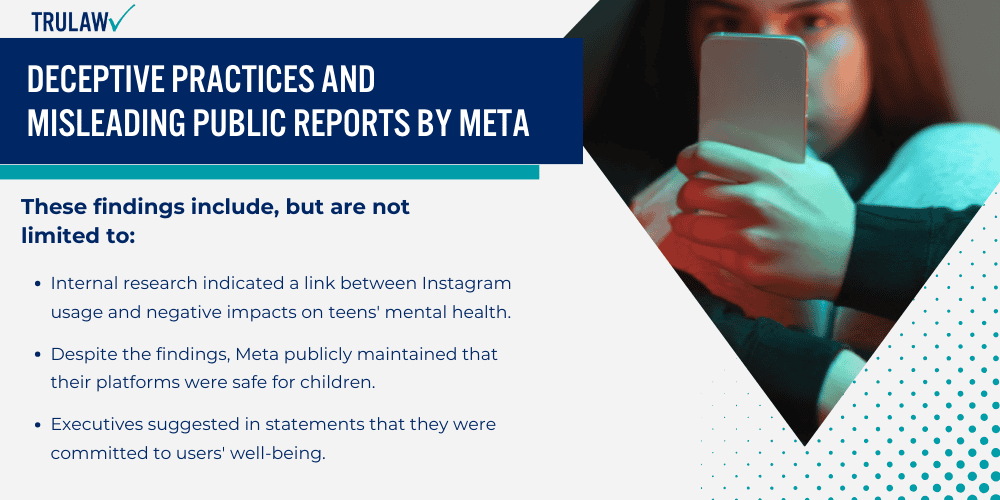
The implications have spurred a series of lawsuits challenging the social media behemoth’s behavior.
Contrast Between Internal Documents and Public Statements
Internal documents released in various lawsuits have shown that Meta was aware of the adverse effects of its platforms on young users.
They highlight the company’s deep understanding of addiction-related features and the mental health ramifications.
Yet, public statements seemed to downplay these insights, often portraying the platforms as benign environments.
**[Replace with lead-in]:**
- Internal research indicated a link between Instagram usage and negative impacts on teens’ mental health.
- Despite the findings, Meta publicly maintained that their platforms were safe for children.
- Executives suggested in statements that they were committed to users’ well-being.
- Multi-state lawsuits suggest the deception may constitute a public nuisance.
The Importance of Transparency and Accountability
With the lawsuits against Meta, there is an increasing demand for transparency in how social media giants conduct internal research and communicate findings.
Accountability is also a key factor, as the public and legal bodies seek to ensure the company takes responsible actions based on their knowledge.
**[Replace with lead-in]:**
- Transparency would mean openly sharing the outcomes of internal studies.
- Holding tech companies accountable involves legal consequences when they mislead the public.
- There is a clear expectation for honest reporting of platform effects, especially on vulnerable users.
- The lawsuits open a path to possibly redefining how social media giants protect younger audiences.
The unfolding legal situation could set a precedent for holding tech giants to a higher standard and ensuring they wield the considerable influence of their platforms with greater responsibility.
Potential for Litigation to Drive Change in the Industry
Litigation against major social media entities has initiated a pivotal shift towards industry accountability and the reinforcement of youth protection measures.
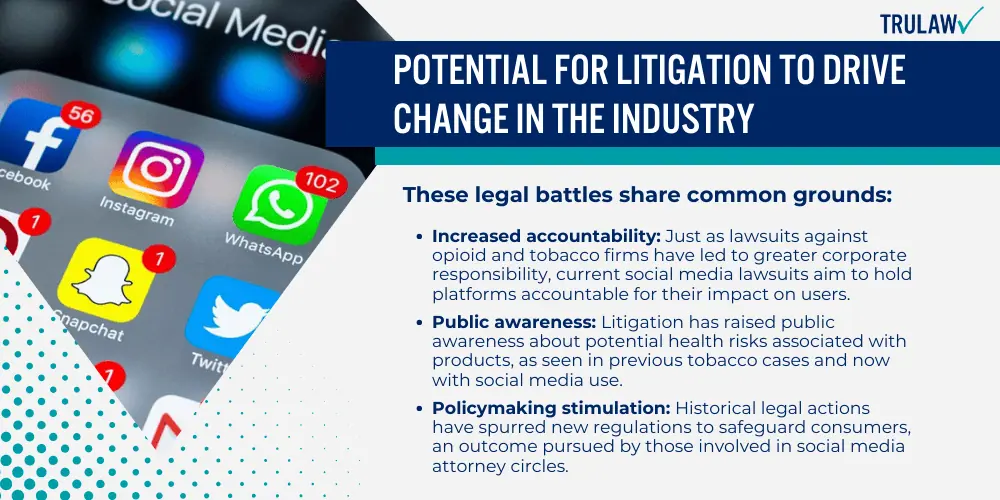
Comparison to Lawsuits Against Opioid and Tobacco Companies
Social media lawsuits are beginning to mirror the legal challenges previously faced by opioid and tobacco companies.
These legal battles share common grounds:
- Increased accountability: Just as lawsuits against opioid and tobacco firms have led to greater corporate responsibility, current social media lawsuits aim to hold platforms accountable for their impact on users.
- Public awareness: Litigation has raised public awareness about potential health risks associated with products, as seen in previous tobacco cases and now with social media use.
- Policymaking stimulation: Historical legal actions have spurred new regulations to safeguard consumers, an outcome pursued by those involved in social media attorney circles.
- Financial repercussions: Significant financial settlements have followed successful lawsuits, incentivizing companies to reconsider their business practices.
The Need for Improved Child Safety Practices and Regulations
Amid growing concerns, school districts and parents are becoming more proactive, demanding better child safety practices in social media usage.
They often turn to legal action as a vehicle for change.
Points of concern include:
- Transparent communication: Social media companies must transparently report the risks and practices that may affect child users.
- Robust age verification: Enhanced methods for verifying user age can prevent underage access to social media platforms.
- Mental health emphasis: The platform’s design should incorporate features that prioritize mental well-being, especially for younger users.
- Collaboration with authorities: Social media firms should cooperate with regulatory bodies to create safer online environments for children.
Actions taken by social media attorneys to seek justice place considerable pressure on these companies, giving rise to the likelihood of significant industry shifts toward safeguarding young audiences.
Through social media lawsuits, stakeholders propose cohesive strategies to modify negligent practices and promote transparency.
Ongoing Investigation and Future of the Lawsuits
The legal landscape is evolving as the investigation into claims that Meta’s Instagram platform has negatively affected young individuals’ mental health continues.
The lawsuits are progressing through the courts, presenting a critical juncture for potential changes in how social media platforms operate.
Updates on the Progress of the Social Media Addiction Litigation
Attorney General Rob Bonta of California and other attorneys general have initiated a new lawsuit alleging that Instagram’s design contributes to excessive use and mental health issues among minors.
The allegations include severe outcomes like suicidal thoughts and suicide attempts as a direct result of excessive social media use.
- The ongoing investigation aims to unpack the relationship between social media use and harm among young users.
- The plaintiffs’ lawyers are focusing on presenting evidence that supports claims that Instagram’s features foster addictive behaviors.
- Federal courts oversee the legal proceedings, specifically the Northern District of California.
- Social media attorneys anticipate that the outcome could shape industry standards moving forward.
The Significance of Bellwether Trials in Setting Legal Precedents
Bellwether trials in cases like this often serve as important indicators for how similar cases may be resolved.
They allow for a thorough examination of evidence in a few cases representative of the larger issues.
- Bellwether trials will likely establish precedents relevant to the social media landscape and its regulatory requirements.
- The federal judge presiding over the bellwether cases will play a pivotal role in influencing the direction and outcomes of subsequent trials.
- Findings on suicidal ideation and the effects of social media could compel changes to platform policies and design.
- Successful litigation might also lead to heightened oversight of social media companies to ensure user safety, particularly that of minors.
Frequently Asked Questions
-
What compensation might be available for individuals in social media addiction lawsuits?
Individuals in social media addiction lawsuits may seek monetary damages for psychological treatment costs, loss of quality of life, and punitive damages intended to deter wrongful company behavior.
They could also pursue restitution for profits companies gained through their alleged wrongful actions.
-
How can one prove harm or damage in a case against social media companies?
To prove harm or damage in a case against social media companies, plaintiffs must typically provide evidence of the addiction’s negative impact on their mental health, supported by expert testimony.
They must also establish a causal link between their use of the platform and the harm suffered.
-
What are the recent developments in lawsuits about social media-related mental health issues?
Recent developments in lawsuits include state attorneys marching together to file legal actions and multi-district litigation (MDL) consolidation to address claims in a coordinated manner.
A noticeable uptick in public awareness campaigns has also been evident, raising the profile of these cases.
-
Which law firms are currently representing clients in social media harm lawsuits?
Notable law firms representing clients in these cases include those with significant experience in class-action and multi-district litigation, such as those previously involved in litigation over tobacco or opioids.
Some firms have established dedicated teams to handle these specific social media cases.
-
What precedents exist for lawsuits claiming addiction to social media platforms?
While direct precedents related to social media addiction may be sparse, similar cases in the realms of pharmaceuticals and tobacco have paved the way for arguments around duty of care and product liability.
These cases often center around the company’s knowledge of potential harm and their responsiveness to it.
-
How does one join a class-action lawsuit against social media companies for addiction or mental health claims?
Joining a class-action lawsuit typically involves contacting a law firm that is handling the suit and providing information about one’s experience with social media addiction.
If the case is certified as a class action, individuals who fit the class definition are automatically included unless they opt out.

Experienced Attorney & Legal SaaS CEO
With over 25 years of legal experience, Jessie is an Illinois lawyer, a CPA, and a mother of three. She spent the first decade of her career working as an international tax attorney at Deloitte.
In 2009, Jessie co-founded her own law firm with her husband – which has scaled to over 30 employees since its conception.
In 2016, Jessie founded TruLaw, which allows her to collaborate with attorneys and legal experts across the United States on a daily basis. This hypervaluable network of experts is what enables her to share reliable legal information with her readers!
You can learn more about the Social Media Harm Lawsuits by visiting any of our pages listed below:
Here, at TruLaw, we’re committed to helping victims get the justice they deserve.
Alongside our partner law firms, we have successfully collected over $3 Billion in verdicts and settlements on behalf of injured individuals.
Would you like our help?
At TruLaw, we fiercely combat corporations that endanger individuals’ well-being. If you’ve suffered injuries and believe these well-funded entities should be held accountable, we’re here for you.
With TruLaw, you gain access to successful and seasoned lawyers who maximize your chances of success. Our lawyers invest in you—they do not receive a dime until your lawsuit reaches a successful resolution!
Do you believe you’re entitled to compensation?
Use our Instant Case Evaluator to find out in as little as 60 seconds!
Camp Lejeune’s water contamination issue spanned several decades starting in the 1950s. Exposure to these chemicals has been linked to various serious health issues, including cancer, organ diseases, and death.
Research is increasingly suggesting a link between the use of Tylenol during pregnancy and the development of neurodevelopmental disorders, such as autism and ADHD, in infants.
Legal action is being taken against manufacturers of Aqueous Film-Forming Foam (AFFF), a chemical used in fighting fires. The plaintiffs allege that exposure to the foam caused health issues such as cancer, organ damage, and birth and fertility issues.
Here, at TruLaw, we’re committed to helping victims get the justice they deserve.
Alongside our partner law firms, we have successfully collected over $3 Billion in verdicts and settlements on behalf of injured individuals.
Would you like our help?
